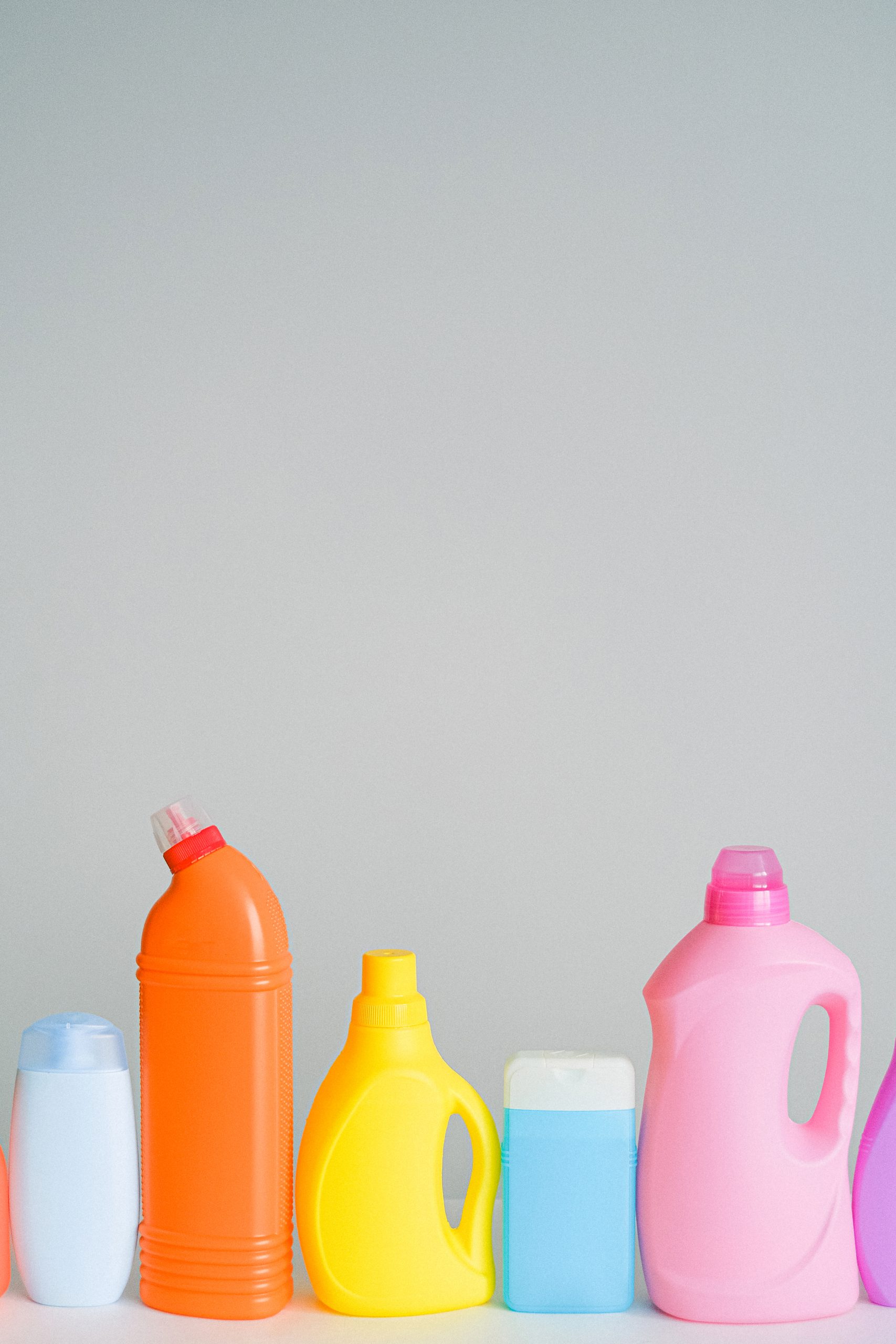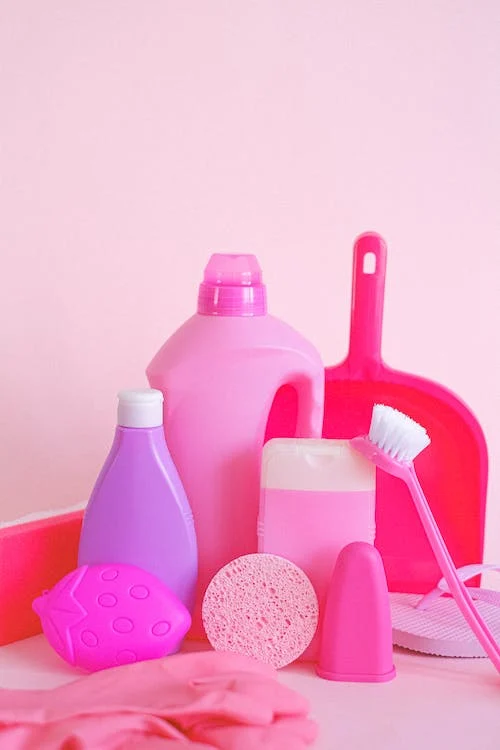Industrial cleaning products almost all contain toxic substances that contribute to indoor air pollution in our homes. However, it is possible to make a very effective and natural multi-purpose cleaner with only two or three ecological products.
We know today that the air inside our homes is sometimes more polluted than the air outside. Chemical cleaning products are not the only cause of this pollution, but they are partly responsible. The multiplication of these products, each one fulfilling a precise function, is also the source of important plastic pollution. In short, why not replace a dozen or so often toxic products with a single ecological, economical, and equally effective product? We explain how to make a natural and environmentally friendly multi-purpose cleaner.
Why replace industrial cleaning products?
Most air fresheners, detergents, and industrial products used for cleaning contain toxic substances that pollute the air inside our homes and apartments. Moreover, a study has shown that industrial products emit numerous volatile organic compounds, some of which, such as acetaldehyde or formaldehyde, are classified as possible or proven carcinogens. “The information provided by manufacturers is relatively fragmented and grouped around generic terms (perfumes, biocides, surfactants, etc.), which makes it difficult to understand their real composition.
Making a homemade multi-purpose product is a healthier, more ecological, and more economical alternative.
The ingredients of the ecological multi-purpose cleaner

As always, the ingredients needed to make homemade household products are inexpensive, widely available, and very versatile.
White vinegar
White vinegar is obtained by acetification of beet or corn alcohol (the ethanol is transformed into acetic acid). It can also be made by diluting pure acetic acid in water, the percentage being then 6 to 8% on average.
Very much used by our grandmothers, who used it for its many virtues, it was then put back in the closet in favor of the many cleaning products whose toxicity is nowadays pointed out. We are therefore witnessing a great comeback of white vinegar as a cleaning product for the house.
Thanks to its acidity (its pH varies between 2 and 3), it has many properties:
– It has a disinfectant action: it is, therefore, perfect for the maintenance of the bathroom, toilet, and kitchen in particular.
– It is deodorizing: we note its radical action on the tenacious odors of cat urine, for example. To avoid bad smells in the fridge, it is recommended to place a small bowl containing 20 cl of white vinegar in it.
– It fights very effectively against limestone: with white vinegar, you can clean your taps, sinks, and washbasins but also maintain your pipes. If your kettle is scaled, fill it with 50% water and 50% white vinegar, then bring the mixture to a boil. Rinse and re-boil with water to remove all traces and odors of vinegar. The result is impressive!
– It is also an excellent stain remover, especially for clothes.
– It can also eliminate mildew and rust.
Warning: never mix bleach with white vinegar. The fumes are toxic.
Here are a few things white vinegar can do for you, in addition to being the basis of a perfect multi-purpose cleaner for the home:
– You can clean your microwave oven by filling a third of a bowl with a mixture of water and white vinegar. Heat the mixture until it boils, then leave the bowl in the microwave with the door closed for two hours.
– You can descale your toilet by pouring pure white vinegar into the bowl. Please leave it in for a few hours and flush.
– By diluting it with ¾ of water, you obtain a very effective stain remover for carpets and rugs.
– It degreases pots and pans very effectively: pour two centimeters of pure white vinegar into the bottom of your pot, bring to a boil and rinse.
– It cleans your windows impeccably, which you can polish with the help of a newspaper.
– Thanks to its anti-limescale action, limescale makes clothes rough, so it is a perfect substitute for fabric softener.
Not to mention its uses as a hair conditioner or lice shampoo! What household product, at less than a dollar a liter, is so versatile and effective, all without any risk to health or the environment?
Black soap
There are two types of black soap: cosmetic black soap and household black soap, which sometimes has a higher potassium content to increase its degreasing power. Real black soap also contains olive oil.
Beware of black soaps that contain very little olive oil potassium soap. A quality black soap should contain 15 to 30%. Some industrial products that claim to be “black soap” contain only 2% potassium olive oil soap…
Household black soap has many properties:
– It cleans, purifies, sanitizes, nourishes, and shines floors, including marble, wooden floors, terracotta tiles or terra cotta, and ceramics.
– It is a formidable degreaser, and thus your ally to clean the kitchen, the hotplates, the hood, the worktop, the oven, or the sink.
– It is also perfect for cleaning windows, fireplaces, and barbecues, as well as colored linen and dishes.
– In the garden, it protects your plants from pests such as aphids, red spiders, or mealy bugs.
– It cleans brushes effectively and removes paint and grease stains from textiles.
– It makes copper and silverware shine.
– It cleans both the interior and exterior of cars.
Black soap is natural, ecological, relatively inexpensive, and very versatile, able to replace a good dozen chemical cleaning products.
Tea tree oil
Tea tree oil is antiseptic, antibacterial, antiparasitic, antifungal, and antiviral. It is obtained by distillation of the tea tree leaves, or Melaleuca alternifolia, a small tree native to northern Australia, also present in the warm areas of northern America. This plant, with many virtues, is cultivated in several regions of the world.
Therefore, tea tree essential oil is ideal for naturally purifying, sanitizing, and disinfecting your home. However, be careful: essential oils are not recommended for pregnant or breastfeeding women or young children.
Two recipes of multi-purpose cleaner
We offer you not one but two recipes of multi-purpose cleaners. Why two? Because white vinegar is not only an excellent cleaner, disinfectant, deodorant, and stain remover but also a powerful anti-scale agent that can be too aggressive and acidic for mineral surfaces such as stone or marble or even for raw wood.
So here is a recipe for a truly multi-purpose cleaner, and one that is suitable for mineral surfaces and raw wood.
A multi-purpose cleaner with white vinegar
For this recipe, you will need:
– 100 ml of white vinegar
– 10 drops of tea tree essential oil
– 400 ml of water
Mix all these ingredients in a spray bottle and stir well before each use.
You can also replace the essential oils, especially if the product is used by a pregnant or nursing woman, with citrus peels. In this case, it will be necessary to proceed as follows:
– Place your citrus peels, ideally organic and well-rinsed, in an airtight jar with white vinegar and water.
– Shake to mix and let macerate for two weeks.
– At the end of these two weeks, your product is ready and smells delicious: all you have to do is pour it into a spray bottle.
You are now equipped to clean your bathroom and your faucets, worktop, stove, sink, oven, windows, and floor if it is not made of stone, marble, or raw wood. This cleaner is perfect for tiles or vinyl floors.
It is best to avoid white vinegar to clean mineral surfaces such as stone or marble and raw wood.
You will need the following ingredients:
– 700 ml of water
– 2 tablespoons of liquid black soap
You will need the following ingredients:
– 700 ml of water
– 2 tablespoons of liquid black soap
– 10 drops of tea tree essential oil
Proceed as follows:
– Heat the water in a saucepan until it is hot but not boiling.
– Pour the hot water into the spray bottle.
– Add the two tablespoons of liquid black soap and the 10 drops of tea tree essential oil.
– Close your bottle and shake vigorously until the soap is completely dissolved.
This cleaner is perfect for the surfaces mentioned above, parquet floors, and all the surfaces in your bathroom and kitchen: it is simply less scouring than the cleaner containing vinegar. There is no need to rinse after use.
Now you can take care of your home without worrying about your health and the environment! Don’t forget to share your experience with us in the section below.

